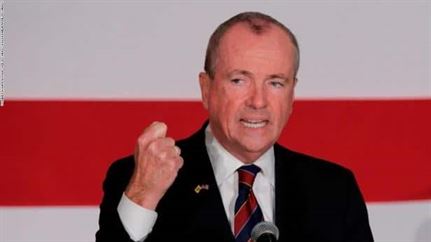New Jersey Gov. Phil Murphy unveiled his tax and budget plan for the state going forward on Tuesday, March 13. Murphy’s plan includes funding New Jersey public schools, improving the terrible NJ Transit, helping the middle class and making community college free for New Jersey residents. All of this sounds great, but if you are like me, you are probably wondering two things: how much does all of this cost and who’s paying for it?
The plan calls for a $37.4 billion budget, adding $1.5 billion in new taxes and closing tax loopholes. The new budget adds to the already insanely high tax burden that New Jersey residents face, representing $2.7 billion more in spending than his predecessor’s plan had.
In 2016, then-Gov. Chris Christie agreed to a deal with the Democrats in the state legislature to cut the state sales tax from 7 percent to 6.625 percent – where it currently stands – to coincide with the gas tax that was placed on New Jersey residents to pay for the crumbling New Jersey Transportation Trust Fund. This plan was supposedly going to cost the state $655 million by the year 2022, but in Murphy’s new plan, the sales tax goes back up to 7 percent.
At the same time, Murphy’s plan adds a tax on recreational marijuana, which will also add income to the state along with cutting spending on incarcerated peoples, as many criminals that are in prison for marijuana possession will be let out.
The increased sales tax is arguably the best new tax in this bill, as it is something most consumers will not notice and will not greatly hurt businesses in the state since prices will not increase dramatically. His is also a fair tax on consumption, as opposed to income or property, meaning we pay taxes every time we buy something. The more money we spend at the store, the more taxes we pay. This is a tax that will affect every income class equally because someone in a higher class is expected to spend more money at the store, and therefore pay more in taxes.
The problem with income tax is that it can be very inconsistent. If people do not spend as much in a given year, the debt will pile up. With Murphy’s millionaire tax plan, New Jersey may lose the biggest spenders in our state and in turn, millions of dollars in revenue.
The biggest perceived issue in Murphy’s plan is his proposed increase of the highest tax bracket from 8.97 percent to 10.25 percent for those who earn $1 million or more. This tax will cause New Jersey’s wealthiest citizens to leave the state in favor of states with much lower income tax rates like Delaware (6.6 percent), Pennsylvania (3.07 percent) and even New York (8.82 percent).
The other problem with this tax, other than its outrageous cost, is the fact that it denotes no difference between a small business filing as an individual making one million dollars in revenue and actual wealthy people, which will clearly hurt small businesses tremendously.
This tax will cause many of New Jersey’s highest earners to leave the state so that they do not have to deal with the incredibly high taxes, causing the state to fall further and further into debt. The state will lose a major source of revenue, which will force the middle class to pick up the pieces.
This is not an assumption. According to Bill Spadea at New Jersey 101.5, the state of New Jersey has seen this problem already. New Jersey has lost about $25 billion over the past 11 years as a result of unreasonably high taxes. Murphy’s plan will cost New Jersey nearly $3 billion in tax revenue.
The state of New Jersey could easily be the best state in the union. We have hardworking and diverse people in our state, beautiful shores, tremendous cities and gorgeous mountain peaks. I would not have wanted to grow up in any other state in the country, but if this budget passes, I am afraid that the state that I love will no longer be able to sustain itself and will force people to leave.
The last thing New Jersey needs is to follow a similar path as California, but it is becoming more and more likely that it may. It is a hard thing to reach, but we must not only cut taxes, we must also cut spending. We simply cannot afford to live with these tax burdens any longer. Indeed, it is a difficult idea to come to terms with, but it is the truth that we must accept if our state is going to survive.



